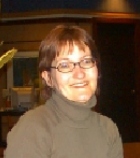High School Transition
Student Success Stories

"It’s important
|
Catherine McGowanCatherine McGowan’s post-secondary career has presented her with a variety of challenges and forks in the road. But with each new path taken, she has learned something about herself and her abilities. Catherine began classes at Ontario’s McMaster University in the early 1980s, after completing high school. She spent two years there, studying general arts. But ultimately, Catherine says, she “had a bit too much fun in those first few years,” and didn’t end up completing the degree. “High school was difficult for me, because I was going through medical testing,” says Catherine, who has a mild form of Muscular Dystrophy. “Going to university was a chance to get away, but I got a bit too caught up in it.” From McMaster, it was on to the University of Regina to study for a bachelor of social work degree. Saskatchewan proved a good fit for Catherine; social work was what she’d originally wanted to study, and she had family to turn to in the province. While at the University of Regina, Catherine also connected with the organization now called the Saskatchewan Voice of People with Disabilities. She looks back fondly on these memories. “It was a life-changing experience,” says Catherine of her affiliation with the group. “A big problem in high school was not feeling like I fit in. The Saskatchewan Voice of People with Disabilities was where I learned that disability was more about environmental barriers than something inside of you.” Catherine finished her bachelor of social work in 1987, and came back to Ontario to live at home and work. A series of social work and disabilityrelated jobs eventually led to a contract with the Manitoba League of Persons with Disabilities in Winnipeg, where she has lived for the last few years. When that job ended, Catherine decided to go to the University of Winnipeg to finish the degree she’d begun at McMaster. She obtained a bachelor of arts in theatre – another of her passions – in 1995. Catherine says going back to school as an adult was helpful. “I have a much clearer idea now of what I want to do.” She is currently finishing a master of social work degree, and hopes to eventually combine her studies working in the emerging field of drama therapy. She also spends some of her time serving as the Manitoba representative on the NEADS board of directors. Catherine says there are a number of things students with disabilities can do to ensure they succeed at the post-secondary level. She says students should begin by doing as much research as possible on schools and programs of interest to them. Finding out as much information as you can early on ensures that you have a sound idea of the services to look for once you’re at a school. Secondly, she says building a support network of people you can turn to is key to success in your studies. Get involved with student groups or even start one yourself, and introduce yourself to the disability service providers on your campus. Financially, students should look at obtaining scholarships, as there are many out there. But above all, says Catherine, have confidence in yourself and your abilities. “It’s important for students to not let themselves get talked out of something they want to do. If you’re faced with problems in your classes, you need to be able to work on getting the right accommodations, rather than being intimidated into switching programs.” |

 Quick Question:
Quick Question:

